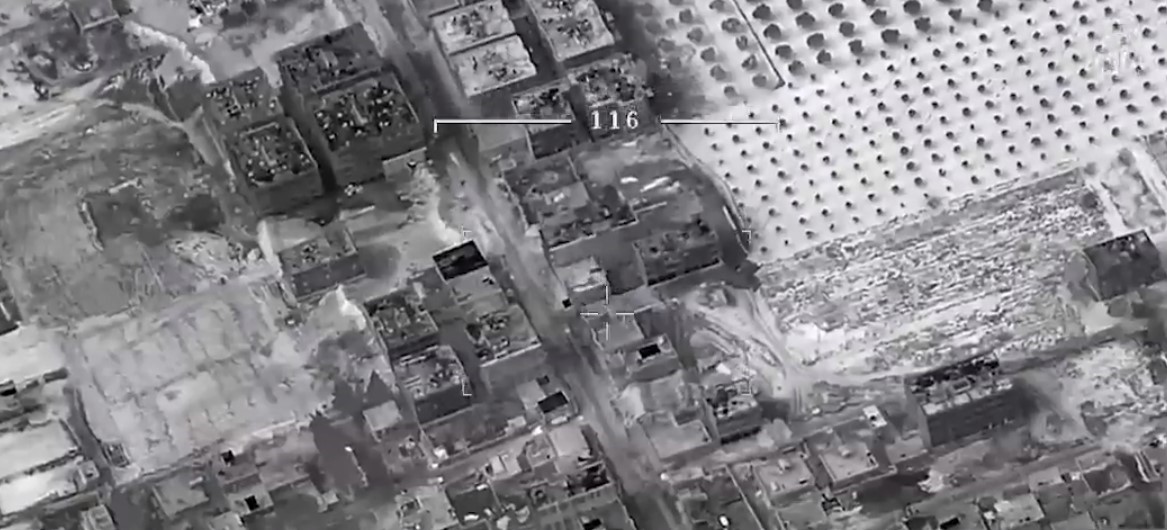
Recent footage captured by Turkish unmanned aerial vehicles (UAVs) shows PKK-linked People's Protection Units (YPG) terrorists deliberately launching attacks targeting Turkish border cities and towns from populated urban areas in Afrin in an attempt to shield themselves from air and artillery strikes.
So far, seven civilians, including two Syrian nationals, were killed and 113 civilians have been injured in southern Turkey's Kilis province and the Reyhanlı district of Hatay province due to indiscriminate rocket attacks of YPG terrorists – the same terrorists who then called on the international community to act on civilian losses using fake images and black propaganda. Since the beginning of Operation Olive Branch to clear the terrorist group from Afrin on Jan. 20, 98 PKK/YPG rockets have landed in urban areas in Hatay and Kilis.
The footage captured by a Turkish UAV on the outskirts of the town Syrian town of Jandaris, seven kilometers northeast of the border with Turkey and 20 kilometers southwest of Afrin town center, shows a vehicle with mounted anti-tank artillery and three terrorists in civilian clothing.
Shortly after, another vehicle with flak gun mounted on top approaches the area, located amid a civilian neighborhood with dozens of homes.
Terrorists position the vehicle to target Turkish territory and fire the weapon. Although their attack is filmed by the UAV, the Turkish military does not carry out an immediate strike out of concern for civilian losses in the area.
Following their attack, terrorists try to escape from the region, but their entire route is monitored by the UAV. They arrive shortly at a building used as a local gathering point for the terrorists, with tires burning in front of it to block visibility.
Seconds after their arrival, Turkish military successfully destroys the building.
The YPG have been using civilians as human shields in Afrin since the beginning of Turkey's operation. The YPG also used a group of civilians, including children, as a decoy in the attack that killed nine Turkish soldiers on Saturday, security sources said.
Meanwhile, the Turkish Armed Forces (TSK) and the Free Syrian Army (FSA) continued to advance on several fronts in Afrin Tuesday. The TSK said yesterday in a statement that at least 1,439 terrorists have been neutralized since the beginning of Operation Olive Branch in Afrin. Turkish jets carried out airstrikes overnight, neutralizing 70 terrorists on Monday, the statement said.
TSK and FSA elements also liberated another village yesterday from the YPG. With Tuesday's capture of Omar Simo, the TSK and FSA have liberated a total of 52 zones, including 34 villages and 14 strategic mountains or hills.
Bomb disposal squads also continue to defuse explosive devices in villages freed by the TSK and FSA planted by the YPG. The terrorist group plants explosives and mines to hamper the progress of the Turkish Air Force (TAF) and FSA troops and prevent civilians from returning to their homes.
An FSA commander, Abu Ahmad Shami, told Anadolu Agency (AA) that YPG terrorists placed explosives and mines everywhere before they fled.
"We don't allow the villagers to return to their homes before their homes are cleared. The terrorists who fled from Dikmah Tash placed devices in the warehouses where the villagers store their olives. They even placed explosives on the dead bodies of their terrorist friends," Shami said.
According to the Turkish General Staff, the Operation Olive Branch aims to establish security and stability along Turkey's borders and the region as well as protect Syrians from terrorist cruelty and oppression.
The operation is being carried out under the framework of Turkey's rights based on international law, UN Security Council resolutions, its self-defense rights under the UN charter, and respect for Syria's territorial integrity, the military said.
The military has also said that only terrorist targets are being destroyed and "utmost care" is being taken to avoid harming civilians.
Afrin has been a major hideout for the PYD/PKK since July 2012 when the Assad regime in Syria left the city to the terror group without a fight.
